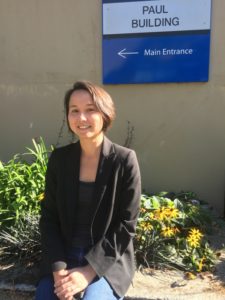Know Your Profs is an ongoing series of profiles on the instructors at Camosun College. Every issue we ask a different instructor at Camosun the same 10 questions in an attempt to get to know them a little better.
Do you have an instructor who you want to see interviewed in the paper? Maybe you want to know more about one of your teachers, but you’re too busy to ask? Email editor@nexusnewspaper.com and we’ll get on it.
This issue we talked to Camosun English instructor Katie Tanigawa about loving all foods, getting a little too into class topics, and defining the future of post-secondary.
1. What do you teach and how long have you been at Camosun?
I started teaching English at Camosun in February.
2. What do you personally get out of teaching?
I learn so much from my students. I’m energized by the questions and insights they bring to class, and I’m inspired by their willingness to learn and grow.

3. What’s one thing you wish your students knew about you?
I hope my students know that I want them to learn, grow, and succeed in ways that are meaningful to them.
4. What’s one thing you wish they didn’t know about you?
Sometimes I swear when I get really excited about a topic we’re discussing in class.
5. What’s the best thing that’s happened to you as a teacher here?
I love it when students have an “a-ha!” moment. For me, classroom “a-ha!” moments occur when students understand a difficult concept, develop a skill they’ve been struggling to develop, or recognize that they are actually better writers/readers/critical thinkers than they previously thought they were.
6. What’s the worst thing that’s happened to you as a teacher here?
Honestly, teaching at Camosun has been a wonderful experience. I’m grateful I don’t have a good answer for this question!
7. What do you see in the future of post-secondary education?
I am warily optimistic about the future of post-secondary education. It’s important to make sure that post-secondary education is relevant to students, but I worry that relevance is sometimes interpreted as only providing training that directly translates into jobs. And while teaching skills that will allow students to be successful in the workforce is important, I worry that this narrow definition of relevance means not valuing the importance of learning about and questioning who and how we want to be in this world. I know this doesn’t sound optimistic, but I actually don’t see this happening at Camosun. Instead, I see instructors who are dedicated to teaching skills that will hopefully translate into meaningful work while also pushing students to think critically about the world. I also see students who are committed to asking hard questions, learning new concepts, and challenging their own perceptions. In large part because of this environment, I’m more optimistic than wary.
8. What do you do to relax on the weekends?
If it’s a long weekend, I’ll try to fit in a quick surf trip up island. Other than that, I enjoy learning—and struggling—to play the guitar and hanging out with family and friends.
9. What is your favourite meal?
Is “everything” an appropriate answer? I love food.
10. What’s your biggest pet peeve?
Sentence fragments. I’m just kidding. My biggest pet peeve is when people lack compassion.
